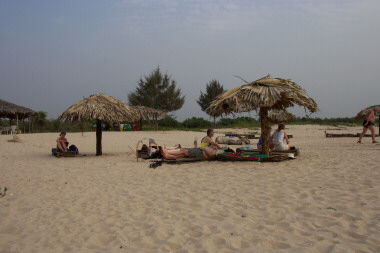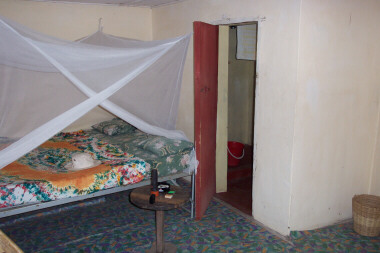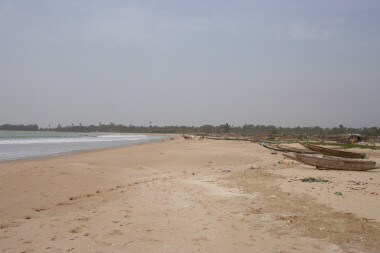Day Seven - Friday, February 1st, 2002 - Sanyang Nature Camp
After our last breakfast for some time at the hotel, a few of us headed off to the office to drop off our laptop computers before our trip since we would not be able to take them (we have been limited to “one” bag and, besides, there is no electricity at the camp) – VSO had indicated that they would ensure they were locked away and would be as safe as possible. Steve, Kate and Ben left for their homes today. They are here for shorter periods (nine months for Steve and six months for Kate and Ben, I believe) so their training has been cut short but we will be seeing them later (we are told) in the training when we return to Fajara. Steve had a bit of a problem with his house so he has chosen to stay an extra night(s?) at the hotel until it is resolved (there are no mosquito screens on the windows). The rest of us loaded up the back of a pick-up with our bags and then waited around for the 4×4 (SUV) that would be taking us to the camp.
It is a nice vehicle but with nine or so of us it was very crowded when Ebrima picked us up (though a few people rode in the back of the cab of the pick-up). The trip down to the camp was relatively uneventful as we passed a number of new developments (schools and homes) that the government and various aid agencies have started. We were lucky enough to actually see a few monkeys as they crossed the road in front of us as well – the first time I had ever seen them “in the wild”! As we passed through Tanji both sides of the roads were all populated with farms or some sort of settlement – before the town, it was basically all parkland – trees and bushes (and monkeys). Tanji is a fishing village right on the ocean and they had a number of fish out on drying racks in the village.
The road right up until we got to Sanyang itself is all brand new (except for in Tanji where we had to got into the dirt for a bit where they were building a new bridge). Most of the road, we were told, has not actually been officially opened yet so Ebrima opened it “on behalf of VSO”. I have not actually got use the the amount of honking that vehicles do here. Since there are so many people using the few roads that are around, most drivers will honk as they pass anyone either walking or on a bicycle (which promptly leaves the road to avoid any possible problems). This means the horn is used a lot.
We entered the Sanyang area travelling for only a short distance before we left the new road onto a dirt road through the village proper. This road is under construction and, I learned later, people all along where the new road is to be built (replacing the existing dirt road) were told they had to demolish their houses and they would be placed into temporary accommodation elsewhere in the village. All along the sides of the road people were taking down their homes with sledgehammers and the like. Most of the homes around here are made of breazeblock (or however you spell it) and are quite substantial. It was an interesting drive as Ebrima weaved around trying to avoid the worst of the holes and other obstacles. Those of us sitting in the very back were bounced around a great deal but it certainly was entertaining.
We were pretty much watched for the whole (slow) trip into the village. Ebrima is from this village so he stopped and talked to people out of the window (or, forgetting the windows were up because of the air-conditioning, shouted loudly in the hopes that those outside could hear) as we went along. Eventually we made it to the “centre” of the village which is home of the telecentre (where you can make telephone calls) and the (Visaca – a government initiative to promote local banking through local VDCs – Village Development Councils).
We waited for quite some time since the other driver had gotten lost and actually taken the pick-up to the camp before he realized his mistake and came to meet us at the village. During the time we were waiting we were greeted by many people from the local VDC and by many of Ebrima's friends but it was a bit as if we were on display since there were many people hanging around where the bush-taxis depart from across the street (a bigger side-lane than anywhere else) and a bit of the market also across the street (never mind the fact we were in front of some of the administrative centre of the town). We had lots of chance to practice our little knowledge of Mandinka and Wollof before they arrived…
After we were all together we were told we had to give a speech so we quickly designated Phillip to do the speaking for us (it would have been a bit easier if we had known this earlier and could have done it a bit more democratically) as we were herded down the road to meet the Alkalo who is the head of the community. He and the council of elders are the traditional “civic government” of most towns. We were guided down some back streets until we were guided into the compound of the Alkalo where we had a number of western-style living room chairs outside in the dust between two houses. They were all aligned along one side of the courtyard with their backs to what we came to know as the Alkalo's house. There were already a number of people present, the elders were on the right of the doorway (again, in the courtyard), and the important ladies of the village were on the veranda behind us on the left of the doorway, all simply waiting for us. Everyone was dressed well and many of us (VSO volunteers) felt a bit out of place since we were not prepared in advance for the formality that this turned out to be and would have dressed more appropriately (many of the ladies in our group had shorts on – a definite no-no in this sort of situation).
There was a bit of a wait for the Alkalo to come out of his house behind us so I took the opportunity to relax a bit and talked to Marcel about his previous placement in Nigeria and comparing it to what he has seen here in Sanyang (so far). As we sat, there were a number of children looking at us through doorways and windows of the building opposite and a number of chickens off to our right under a massive orange tree.
It was already beginning to get quite warm as there were a number of speeches (mostly in English though, when in another language, they were translated for us) by a representative of the VDC and a number of people from the council of elders and only a few words from the Alkalo (he is getting up to about 100 years old so does not really say a lot or move about a lot). After Phillip gave our speech (doing an absolutely marvellous job – we later all agreed) he gave our gift of Kola nuts which are a traditional gift to the Alkalo when visiting a village or the head of the household when visiting that. It turns out that there is normally a much more elaborate welcoming ceremony but since there was a death today of someone important in the village this was curtailed out of respect.
After the speeches we got up (a bit tricky since the seats were, for the most part, quite low to the ground) and had a short walk to the centre of the market. As we headed there we were joined by many children who held our hands as we walked through the back alleys (roads). At the market we were bought some Baobab juice that is frozen into small plastic bags – you bite the corner off and simply suck at the juice as it melts – it was very tasty. As we then made our way back to the cars I had a chance to talk to the person in charge of communications from the VDC – Lamin – who talked a bit about the village and the development of the road through the centre. He did not seem to think it would cause a “divide” of the community having a massive new paved road through the centre of it.
We headed back along the same road as we left for the camp which is close the beach, about a mile or so from the village. As we crossed over the paved road that we had taken earlier, Ebrima had to drive carefully to avoid a barricade that largely blocked the road to the camp directly off the new road (probably left over from the construction). It was a very bumpy drive as we made our way to the camp avoiding all sorts of hazards along the way: cows, people, chickens, holes, rocks, etc. We passed by a number of small compounds and fields as we eventually turned into the camp.
The camp is quite different from the the surrounding area – it has a bit of grass for a start (we laughed at the sign to the left of the road as we entered “car park” which is in the middle of a very small area of grass with no obvious signs that it has EVER been used for parking vehicles). The huts we will be staying in look quite nice with thatched roofs and concrete walls and floors. Some of them are round, others are rectangular in shape with all having a bit of a veranda.
We all gathered in the central meeting area – a big thatch-covered area with a concrete floor with a number of tables and chairs – and hammocks in it right beside the “check-in desk/bar/kitchen”. It is very quiet. We were organized into rooms and we quickly got our bags and delivered them appropriately before being fed lunch. Lunch was, as might be expected in this area of fishing, fish with rice – pretty good (this dish is called “benechin” – fish with flavoured rice). After lunch we decided to head off to the beach so we were given a ride. At the entrance to the camp we headed to the right and went for only a short distance along the road until it dead-ended at a smaller version of Tanji – a number of covered areas with people selling fish and a number of fisherman around working on their boats or in their smokehouses.
We picked our way to the beach from the car park and saw that the tourists were to the right (there is a small hotel just down the beach) and there was nothing on the left. We headed left and found a small bar with no one at it on the beach that had a number of thatched parasols in the sand with some “beach beds” scattered around (basically wicker-like low beds – about five inches high – that you can lay on). The bar part of it was two larger pagoda's that had chairs and tables inside them a bit further away from the ocean. A lady came out into the sand to take our order but I headed into the ocean right away.
The water is a lot calmer and the current a lot weaker than at Leybato and there are no people really here which is just perfect after a rather tense morning in the village (well, we had felt a bit on display). After the water we sat around and had a few drinks and chatted about the morning. They even have a limited menu at this bar though how they can charge 200 delasis for prawns or lobsters I cannot figure out (it turns out that each of these dishes are a kilogram in weight, which helps to explain the rather high price).
 Volunteers Hard at Work on Sanyang Beach
Volunteers Hard at Work on Sanyang Beach
Chris went for a walk, as per normal, down the beach as did a number of other people. Phillip had a bit of trouble when he was solicited near the hotel but other than that there was only one person selling bracelets (which a few people took a look at). We relaxed for the rest of the afternoon, watching the fisherman bringing in their long wooden canoe-like fishing boats just a short distance away (right beside, if that is the correct term, the bar, if that also is the correct term). Eventually we were all together as a group and then decided to head back to the camp to prepare for dinner. We were guided along a back path away from the bar that went around the smoke houses (a rather dirty and rough looking area) back to where the car had earlier dropped us off and we headed back along the road. As we walked along we passed a large marsh area with a number of fantastic birds – we spotted more than one egret along with a number of others that we could not identify.
I had a bit of a shower and relaxed before dinner which was held in the dark. They have a man that goes around every day and fills and lights the various oil lamps they have around the camp. There are a number of these lamps in the eating area and they are also along the road and in front of each of the huts so that we don't have to be completely “in the dark”. After dinner Jane and I played a few card games before heading off to bed. I can see that because of the dark the evenings will be quite early for the next week.
My room is quite basic with a large wicker-like shelving unit in one of the “corners” (since the hut – which has a total of about four rooms – is round there are a few odd angles in the room), a wicker chair, a big queen-sized metal-framed bed (figuring out the mosquito net was a bit of a trick), a small spool bed-side table (useful for candle-holding), a shower (which works when the windmill outside is turning to pump the water) and a toilet (which not so much flushes as sloshes water about). I have also been given a bucket which I think will come in handy for when the windmill is not working and I need a shower.
 My Room at Sanyang Nature Camp
My Room at Sanyang Nature Camp
⇒ Continue to Day Eight - Saturday, February 2nd, 2002 - Sanyang Nature Camp
